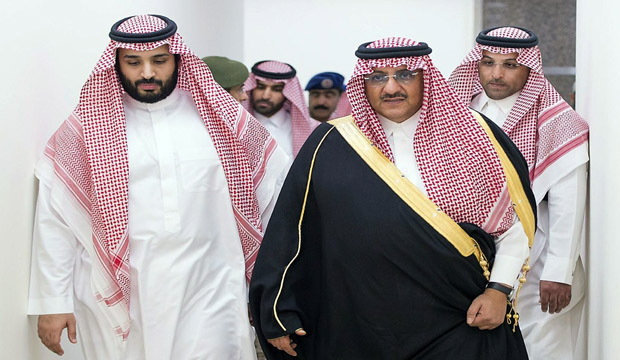Even as Saudi Arabia fights a war along its borders, the Kingdom has achieved greater national stability by continuing its strategy of transferring power to the second and even third generation of the House of Saud. What is happening outside Saudi Arabia’s borders is not important, even if the unrest reaches the stage of all-out war. This is because of what is happening inside Saudi Arabia, which confirms day after day that the Kingdom is more than capable of tackling regional insecurity. Saudi Arabia’s leadership has confirmed that it can be relied upon; the leadership has always taken wise and balanced decisions whenever the need arises. This can be seen in the latest decisions issued by Custodian of the Two Holy Mosques King Salman Bin Abdulaziz, and particularly in the appointment of Prince Mohammed Bin Naif as Crown Prince and Prince Mohammed Bin Salman as Deputy Crown Prince.
Yesterday’s royal decrees were not routine; decrees such as these are only issued once every few decades. King Salman is restructuring the Saudi state and regulating the work of the government. Former Crown Prince Muqrin Bin Abdulaziz was relived at his own request by King Salman. The Saudi monarch then appointed a new Crown Prince and Deputy Crown Prince, as well as making a number of other ministerial appointments. King Salman did all of this at a time when Saudi Arabia is in the midst of a war, fighting alongside an international coalition to restore security and stability to a neighboring country. All the while, Saudi Arabia’s enemies are seeking to threaten its borders.
The Kingdom’s enemies are envious of its ability to issue such revitalizing decisions. Every time they think they have the Kingdom on the back foot, Saudi Arabia’s leadership rises to the challenge and issues, again and again, historic decisions such as this.
In a previous opinion piece, I wrote that stability is a Saudi industry. Therefore, despite all these important and historic decisions, the Saudi street is not surprised by the Kingdom’s ability to handle all the different variables and emerge with decisions like these—no matter how complex these variables may be and despite some people viewing the task as impossible.
The basic problem with the incorrect analyses that are put forward by think tanks, research centers, and so-called western experts is that they believe that they know Saudi Arabia better than its own people. They put forward their views on the Kingdom when in reality they are thousands of miles away. For example, one Western journalist yesterday made the claim that the reason for these changes in the Saudi leadership is due to what is happening in Yemen. Such illogical views and analyses are repeated, with different emphasis, here and there. Sometimes I can understand their failure to understand the reality of the situation and their determination to proceed with their mistaken impressions, because they cannot believe that a country that is surrounded by threats from every direction can take such unprecedented decisions without suffering any negative effects.
Different parts of the Arab world have caught fire, with hundreds if not thousands feeding these flames, calling for the youth of their countries to be empowered. In the end, and in spite of the high cost, this objective has not been achieved. As for the Kingdom of Saudi Arabia, its youth have been empowered in just a short period of time, without the country paying a price for it. This is a Kingdom of natural progression, rather than one that is subject to regional tremors and shocks.
All that is left now is to remember two men who deserve our appreciation and respect for what they have done throughout their years of service to the Kingdom. Prince Muqrin Bin Abdulaziz is a statesman who served his country well, firstly as a pilot and then later in successive government posts, ending up as the country’s second-highest-ranking official. As for Prince Saud Al-Faisal, he has been an incredibly popular minister who sacrificed his efforts, health and time over forty years in the service of the Kingdom. It is enough to say that the people of Saudi Arabia loved him as a minister and are sad to see him go as he hands over his ministerial portfolio.
An Agence France-Presse reporter asked me yesterday about the significance of the changes that have been made by the Saudi monarch, and I stated that King Salman’s decisions have set the rhythm of the Saudi state for decades to come. The Kingdom confirms once again that it can be renewed, and perhaps what confuses others is that this injection of new blood comes at a time when the sound of Saudi artillery fire has not yet fallen silent.
Indeed, the Kingdom of Saudi Arabia is being regenerated and it does not age.
